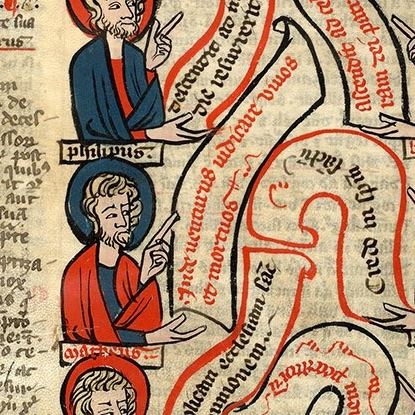One older meaning of the word & #39;quick& #39; is & #39;living& #39;.
We can see this in the phrase & #39;the quick and the dead& #39;, which is a translation of Latin & #39;vīvōs et mortuōs& #39;.
However, & #39;quick& #39; is not only a translation of vīvōs - the two words are in fact distantly related to each other. https://abs.twimg.com/emoji/v2/... draggable="false" alt="🧵" title="Thread" aria-label="Emoji: Thread">
https://abs.twimg.com/emoji/v2/... draggable="false" alt="🧵" title="Thread" aria-label="Emoji: Thread">
We can see this in the phrase & #39;the quick and the dead& #39;, which is a translation of Latin & #39;vīvōs et mortuōs& #39;.
However, & #39;quick& #39; is not only a translation of vīvōs - the two words are in fact distantly related to each other.
*gʷ was a sound in PIE, present in *gʷeih₃- & #39;live& #39;.
Through Grimm& #39;s law, *gʷ became /kw/ in Old English, hence English & #39;quick& #39;.
In Latin, *gʷ simplified to just /w/, hence vīvus & #39;living& #39;.
In Greek, *gʷ sometimes became /b/, as in bíos & #39;life& #39; (from which we get & #39;biology& #39;).
Through Grimm& #39;s law, *gʷ became /kw/ in Old English, hence English & #39;quick& #39;.
In Latin, *gʷ simplified to just /w/, hence vīvus & #39;living& #39;.
In Greek, *gʷ sometimes became /b/, as in bíos & #39;life& #39; (from which we get & #39;biology& #39;).
However, to reconstruct an ancestor sound, we need more examples of English /kw/ (or just /k/) corresponding to Latin /w/ and Greek /b/.
For example, we have English & #39;come& #39;, Latin veniō & #39;I come& #39; and Greek baínō & #39;I go& #39;.
These three can be derived from the PIE root *gʷem-.
For example, we have English & #39;come& #39;, Latin veniō & #39;I come& #39; and Greek baínō & #39;I go& #39;.
These three can be derived from the PIE root *gʷem-.

 Read on Twitter
Read on Twitter " title="One older meaning of the word & #39;quick& #39; is & #39;living& #39;.We can see this in the phrase & #39;the quick and the dead& #39;, which is a translation of Latin & #39;vīvōs et mortuōs& #39;.However, & #39;quick& #39; is not only a translation of vīvōs - the two words are in fact distantly related to each other. https://abs.twimg.com/emoji/v2/... draggable="false" alt="🧵" title="Thread" aria-label="Emoji: Thread">" class="img-responsive" style="max-width:100%;"/>
" title="One older meaning of the word & #39;quick& #39; is & #39;living& #39;.We can see this in the phrase & #39;the quick and the dead& #39;, which is a translation of Latin & #39;vīvōs et mortuōs& #39;.However, & #39;quick& #39; is not only a translation of vīvōs - the two words are in fact distantly related to each other. https://abs.twimg.com/emoji/v2/... draggable="false" alt="🧵" title="Thread" aria-label="Emoji: Thread">" class="img-responsive" style="max-width:100%;"/>


